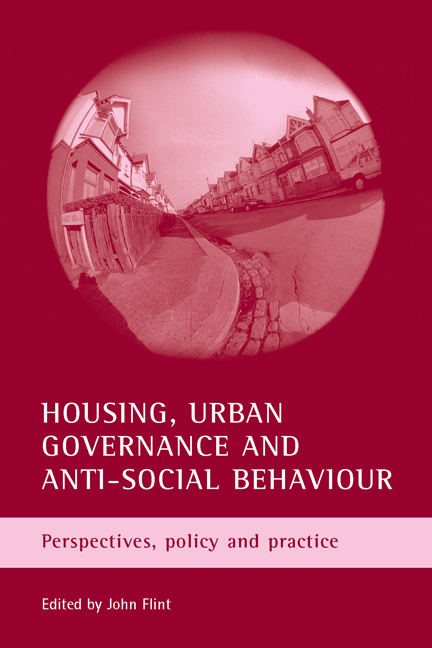Book contents
- Frontmatter
- Contents
- List of tables, figures and photographs
- Acknowledgements
- Notes on contributors
- Introduction
- Part 1 The definition and construction of anti-social behaviour in the UK
- Part 2 Legal techniques and measures utilised by social landlords to address anti-social behaviour
- Part 3 The emerging mechanisms of addressing anti-social behaviour in housing governance
- Part 4 Studies of housing and anti-social behaviour from an international perspective
- Index
sixteen - Conclusion
Published online by Cambridge University Press: 15 January 2022
- Frontmatter
- Contents
- List of tables, figures and photographs
- Acknowledgements
- Notes on contributors
- Introduction
- Part 1 The definition and construction of anti-social behaviour in the UK
- Part 2 Legal techniques and measures utilised by social landlords to address anti-social behaviour
- Part 3 The emerging mechanisms of addressing anti-social behaviour in housing governance
- Part 4 Studies of housing and anti-social behaviour from an international perspective
- Index
Summary
This concluding chapter identifies the key themes that have emerged across the contributions in this book and sets out an agenda for future research into housing, urban governance and anti-social behaviour (ASB).
Key themes
Analysing the construction of anti-social behaviour
The concept of ASB is constructed by a large number of actors working through various mechanisms. Much of the current policy emphasis is on operationalising ASB, both through providing legally and practically applicable definitions and through attempts to quantify the extent of such conduct and trends in its growth or reduction. However, some of the difficulties that government and professional bodies have faced in these attempts reflect, firstly, the sheer range of behaviours that it may encompass and, secondly, how ASB, linked to concepts of normality, deviance, duty, obligation, conditionality and responsibility, is an inherently contested and shifting notion, subject to constant reinterpretation and negotiation. Through such processes a dominant discourse is discernable, driven in a cyclical process by powerful media and government rhetoric, diffused, interpreted and subsequently reconfigured by intermediary agencies such as social landlords and also by individual citizens, who as tenants or owner-occupiers subsequently perceive a growing social problem and demand further action, reinforcing and legitimising government discourse as arising from the demands of the general population. A key feature of definitions of ASB in government discourse and legislation has been the blurring of criminal and non-criminal conduct and an expanding range of behaviours that are regarded as anti-social (see Rowlands, 2005; Scraton, 2005).
This dominant discourse has been remarkable for its historic consistency in being founded on the juxtaposition of (undefined) norms and values, ethical standards and respectable forms of behaviour among the majority of ‘ordinary’ people with the deviant and morally deficient conduct of marginalised ‘others’. Engagement in ASB is in a literal sense conceived as being ‘against society’, and necessitates that society be defended through a range of disciplinary sanctions, with or without a rehabilitative element. Judy Nixon and Sadie Parr in Chapter Four demonstrated that such discourses play out at individual and neighbour levels. In Chapter Thirteen, Kathy Arthurson and Keith Jacobs present evidence from Australia, importantly showing, however, that such discourse is not inevitable, either at government or community levels.
- Type
- Chapter
- Information
- Housing, Urban Governance and Anti-Social BehaviourPerspectives, Policy and Practice, pp. 325 - 334Publisher: Bristol University PressPrint publication year: 2006



